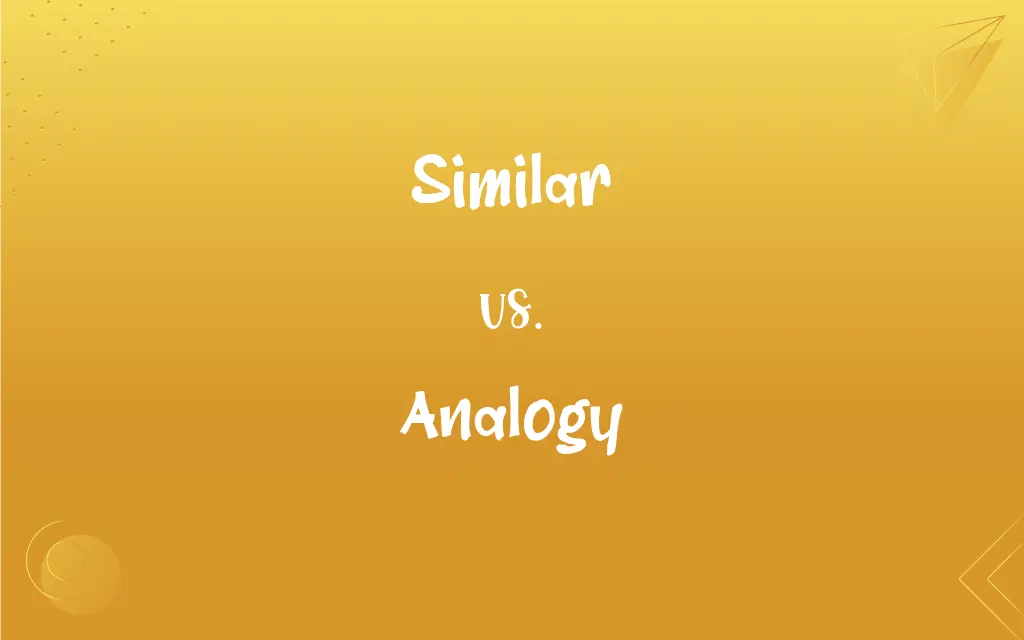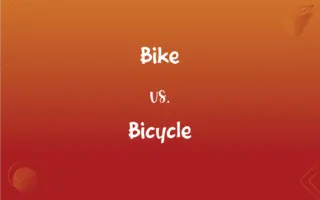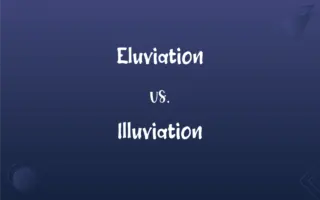Similar vs. Analogy: What's the Difference?
By Janet White || Updated on November 14, 2023
"Similar" means having likeness or resemblance, while "analogy" is a comparison between two things to explain or clarify.

Key Differences
"Similar" denotes a degree of likeness or resemblance between two or more entities, often used to describe objects, people, or situations. "Analogy," on the other hand, is a rhetorical device or a logical argument where similarities are drawn to explain or illustrate a point.
In usage, "similar" is an adjective describing characteristics that are alike but not identical. In contrast, an "analogy" is a noun, often used to simplify complex ideas by comparing them to more familiar things.
"Similar" can apply to physical characteristics, behaviors, or ideas that share common traits. "Analogy," however, goes beyond mere similarity by drawing a parallel between two different things to clarify or explain.
The concept of being "similar" does not imply a relationship or function, merely a resemblance. An "analogy" often serves a specific purpose, such as teaching, explaining, or persuading.
In communication, "similar" is straightforward, indicating likeness. "Analogy" is more complex, involving reasoning and the ability to perceive relationships between different concepts or objects.
ADVERTISEMENT
Comparison Chart
Definition
Having likeness or resemblance
A comparison to explain or clarify
Part of Speech
Adjective
Noun
Usage Context
Describing characteristics
Simplifying complex ideas
Purpose
Indicating resemblance
Teaching, explaining, persuading
Complexity
Straightforward, direct
Involves reasoning and relational thinking
ADVERTISEMENT
Similar and Analogy Definitions
Similar
Having a resemblance in appearance, character, or quantity.
The twins are similar in appearance but different in personality.
Analogy
Explaining something complex by relating it to something more familiar.
To explain the concept, she drew an analogy to a well-oiled machine.
Similar
Sharing qualities, but not identical.
Their writing styles are similar, yet each has a unique voice.
Analogy
A comparison between two things for clarification.
He used an analogy of a tree's roots to describe family heritage.
Similar
Almost the same, but not exactly.
The two paintings are similar, but the colors vary slightly.
Analogy
A rhetorical device to make a point through comparison.
In his speech, he used an analogy to connect his ideas to everyday experiences.
Similar
Alike in substance or essentials.
The rules of the game are similar to those of chess.
Analogy
A parallel drawn to explain or reason something.
His analogy between the human brain and a computer simplified the discussion.
Similar
Comparable in many respects.
The climate in the two regions is similar.
Analogy
A figurative description to aid understanding.
The teacher used the analogy of a river to explain the flow of history.
Similar
Having a resemblance in appearance or nature; alike though not identical.
Analogy
A similarity in some respects between things that are otherwise dissimilar
Sees an analogy between viral infection and the spread of ideas.
Similar
(Mathematics) Having corresponding angles equal and corresponding line segments proportional. Used of geometric figures
Similar triangles.
Analogy
A comparison based on such similarity
Made an analogy between love and a fever.
Similar
Having traits or characteristics in common; alike, comparable.
My new car is similar to my old one, except it has a bit more space in the back.
FAQs
Is an analogy always based on logical comparisons?
Generally, yes, though it can also be creative or figurative.
Do "similar" things always have a common function?
Not necessarily, they may share appearances or qualities without the same function.
Is "similar" subjective in its interpretation?
It can be, as perceptions of similarity may vary.
Can an analogy be used in scientific explanations?
Yes, it's often used to simplify complex scientific concepts.
Can "similar" be used for exact matches?
No, "similar" implies likeness but not exactness.
Are "similar" things always related?
Not necessarily; they may share traits without being related.
Is an analogy always based on similarities?
Primarily, though it may also highlight differences for contrast.
Can an analogy be a teaching tool?
Yes, it's frequently used in education to explain new concepts.
Does "similar" imply any degree of difference?
Yes, it implies some degree of difference, however small.
How is an analogy different from a metaphor?
An analogy is a comparison for explanation, while a metaphor is a direct symbolic representation.
Can analogies be misleading?
Yes, if the comparison is inappropriate or overly simplistic.
Are analogies used in literature?
Yes, extensively for imagery and explaining abstract concepts.
Are "similar" objects or ideas interchangeable?
Not always, as they can have distinct features despite similarities.
Can "similar" describe relationships?
Yes, in terms of characteristics or behaviors.
Is an analogy helpful in problem-solving?
Yes, it can offer new perspectives or approaches to a problem.
Is "similar" used in mathematics?
Yes, in discussing shapes, figures, or quantities.
Can "similar" be used for emotions or feelings?
Yes, to describe comparable emotional experiences.
Can analogies be used in everyday conversation?
Absolutely, often to make complex ideas more understandable.
How complex can an analogy be?
It can range from simple to quite complex, depending on the context.
Does "similar" have synonyms?
Yes, like "alike," "comparable," or "akin."
About Author
Written by
Janet WhiteJanet White has been an esteemed writer and blogger for Difference Wiki. Holding a Master's degree in Science and Medical Journalism from the prestigious Boston University, she has consistently demonstrated her expertise and passion for her field. When she's not immersed in her work, Janet relishes her time exercising, delving into a good book, and cherishing moments with friends and family.
































































